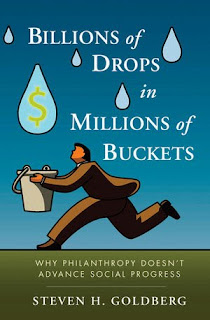Recently, I received a copy of a most provocative book by Steven H. Goldberg, Billions of Drops in Millions of Buckets: Why Philanthropy Doesn't Advance Social Progress (John Wiley & Sons, 2009). Clearly, this book is worth the attention of anyone involved in non-profit management, fund development and the delivery of high-impact approaches to addressing vexing social challenges.
Goldberg, trained as an attorney, assembles the thinking of a wide variety of folks working to change the equity equations of our economy and our culture to benefit those who suffer in marginalized positions.
For example, I love the definitions he digs up for the term "social entrepreneurship" (page xxv).
"Social entrepreneurs play the role of change agents in the social sector, by: adopting a mission to create and sustain social value (not just private value), recognizing and relentlessly pursuing new opportunities to serve that mission, engaging in a process of continuous innovation, adaptation, and learning, acting boldly without being limited by resources currently in hand, and exhibiting heightened accountability to the constituencies served and for the outcomes created." (J. Gregory Dees, "The Meaning of Social Entrepreneurship")
"A social entrepreneur is any person, in any sector, who uses earned income strategies to pursue a social objective, and a social entrepreneur differs from a traditional entrepreneur in two important ways: . . . their earned income strategies are tied directly to their mission. . . [and] social entrepreneurs are driven by a double bottom line, a virtual blend of financial and social returns." (Jerr Boschee and Jim McClurg, "Toward a Better Understanding of Social Entrepreneurship: Some Important Distinctions")
"We define social entrepreneurship as having the following three components: (1) identifying a stable but inherently unjust equilibrium that causes the exclusion, marginalization, or suffering of a segment of humanity that lacks the financial means or political clout to achieve any transformative benefit on its own; (2) identifying an opportunity in this unjust equilibrium, developing a social value proposition, and bringing to bear inspiration, creativity, direct action, courage, and fortitude, thereby challenging the stable states hegemony; and (3) forging a new, stable equilibrium that releases trapped potential or alleviates the suffering of the targeted group, and through imitation and the creation of a stable ecosystem around the new equilibrium ensuring a better future for the targeted group and even society at large." (Roger L. Martin and Sally Osberg, "Social Entrepreneurship: The Case for Definition")
What is your take away here? I'd love to read your reactions.

2 comments:
Could you put it in plain English?
For an increasingly long stretch of time, I've come to believe that the typical work which we social service non-profits do is, in some way, superficial.
If systemic causes are the driving forces behind the symptoms which we see and deal with every day, then why are we not attempting to address those same systemic causes, and address them in systemic ways? To use the book title metaphorically (and to turn it slightly upsidedown), why should we have 'millions' of social service agencies / programs / projects / workers individually and unilaterally attempting to address problems which are caused by systemic forces? Robert Eggers of DC Kitchen's V3 project makes some (a lot?) of sense here: why not unite across geographical, sociocultural, and economic lines, as the social service sector, in order to address root causes together?
If all 550+ (900+?) social service agencies in Dallas got together - or even a smaller number, say, that included all of the ones that dealt with homelessness in one way or another - and approached City Hall / Dallas County / the State of Texas and said that homelessness was not acceptable in Dallas anymore, and demanded that the governments came on board WITH US...couldn't we get more things done?
Government law and policy, unfortunately, drives too many of the issues that we deal with. Fortunately, however, government is made up of 'us.' Could we not work together to get government to solve the situations which it has/we have created? I think so.
Here are some examples: because 1/3 of the entire homeless population is made up of veterans, could not the government (of 'us') create housing for veterans? Because African-Americans and other blacks are continually discriminated against in the employment finding, house-buying, police stopping, and judicial sentencing processes, all of which helps lead to homelessness and other issues, could not the government (of 'us) create and enforce laws that stop and prohibit these practices?
Post a Comment